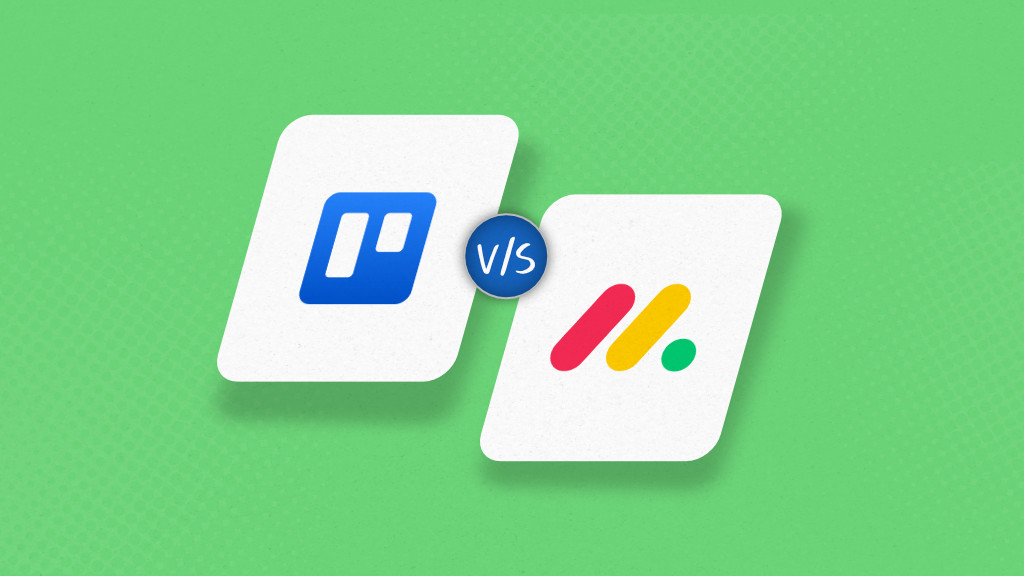Introduction
Project management tools play an important role in effectively managing projects, teams, and collaboration. There are many tools in the market; however, Trello and Monday are two of the most popular platforms for helping teams stay organized and meet their goals.
Choosing between these two can be challenging, as both offer robust features for different user needs. So, which one is best for you?
In this article, we will make a detailed comparison of Trello vs. Monday to help you determine which platform is the right fit for your team.
Trello and Monday.com overview
Trello is one of the renowned platforms with basic project management capabilities. The platform takes a simple approach to the Kanban board, collaboration capabilities, and task scheduling. Advanced operations are highly dependent on power-ups to turn into powerful sources. Trello’s free plan, however, is quite popular because of its comprehensive features for getting tasks done.
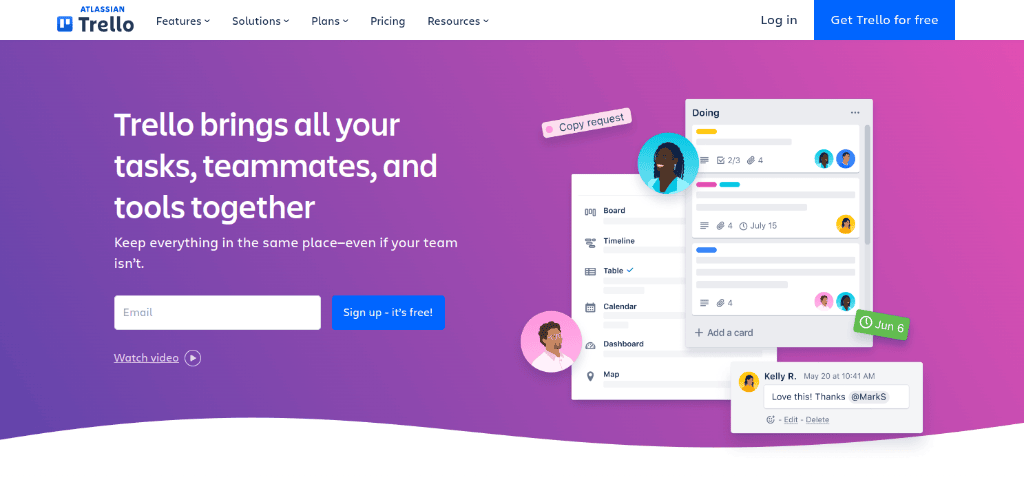
Monday.com might be called a project management tool, but it deals mainly with work management. Beyond this core functionality, monday.com offers two more products: Sales CRM and monday Dev. These products cost you extra bucks if you want to purchase them. If we talk about monday.com’s free plan, it is limited compared to Trello in terms of features and storage.
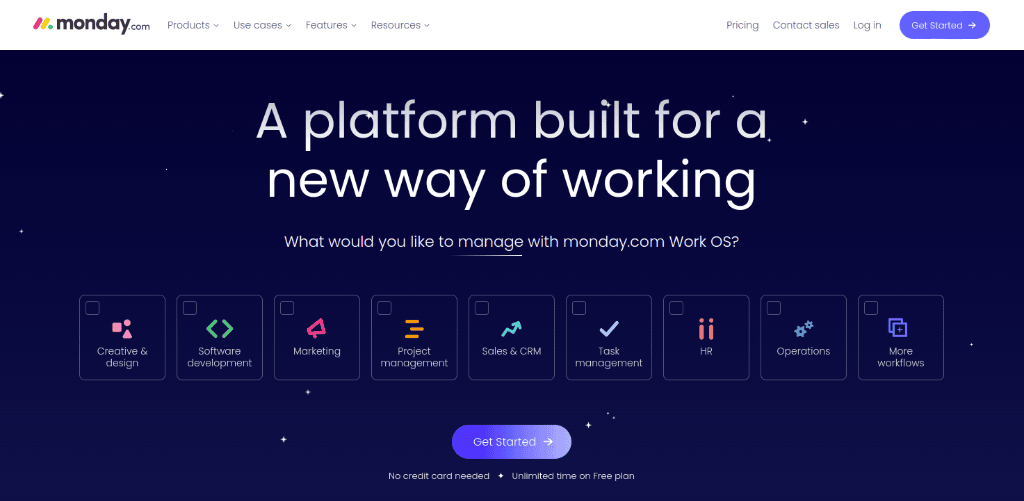
See how Trello stands in comparison with ProofHub. Read now – Trello vs ProofHub
How is Trello different from Monday?
The main difference between Trello and Monday is that Trello uses a simple, visual board system to manage tasks, making it ideal for small teams and straightforward project management. On the other hand, Monday provides a more customizable platform with various views, automation, and advanced features, making it suitable for complex project workflows.
Trello vs Monday.com features comparison
1. Project management
When it comes to project management, Trello follows a basic Kanban-based approach. The three-hierarchy visual Trello infrastructure comprises boards, lists, and cards. The basic working of this simple and flexible platform revolves around moving cards across various task lists representing stages.
As discussed above, Monday.com is a work management software that still offers a promising feature set for project management. You can do everything from project planning and resource allocation to tracking project progress and team performance in this centralized platform.
Read more: Choose from the best project management tools & software for your team
2. Task management
Trello is a favorite among project managers who prefer a visual workflow outlook. Its cards represent the tasks, and the task list reflects the task stages, named “To Do”, “In Progress”, and “Completed. A card is a repository of all the task-related information, including assignees, due dates, work details, file attachments, etc., where users can collaborate using comments.
With Monday.com, assigning tasks to multiple team members, setting task priorities, and managing various tasks is convenient. Its color-coded work status and progress bars make it easy to get visual task status updates. You can also attach & share files, brainstorm ideas, and leave comments on the tasks for enhanced collaboration. However, you cannot track task dependencies and time until you commit to a high-tier plan.
3. Collaboration
In the name of collaboration, Trello offers pretty basic functionalities and lacks real-time collaboration tools. It allows you to create cards (tasks) on boards, set due dates on cards, and use @mentions to grab someone’s attention on cards. You can even comment on these cards to ask for updates, ask questions, and share feedback.
Monday.com, on the other hand, gets an edge over Trello with its slightly more advanced collaboration capabilities. Along with mentioning team members in comments like Trello, you can utilize whiteboard discussions to collaborate with team members. Users can also use the activity feed widget to track the team’s real-time activity.
4. Integrations
Trello offers 200+ integrations called power-ups to extend its functionality beyond its existing tech stack. These include Slack, Google Drive, Gmail, Basecamp, Zoom, ClickUp, etc. These add-ons are not limited to any specific plan but are available on the free plan.
Monday.com supports 72+ integrations with apps such as Google Drive, Microsoft Excel, Microsoft Teams, Zoom, Google Calendar, Shopify, PipeDrive, Microsoft OneDrive, etc. The integration actions, however, vary as you move up the pricing plans, with no integration action available in the free and basic plan.
5. Customization
The Only customization Trello can offer is to customize card details and user interface. That, too, has pretty basic customization options.
Monday.com has a more vital customization game than Trello. Users can customize the platform for workflow, project management, marketing, human resources, and more. Also, teams can tailor the dashboard and report with its simple drag-and-drop widgets to fit their user-specific needs.
6. Learning curve
When it comes to ease, Trello outshines monday.com. The platform’s simple user interface and intuitive board-based approach offer no minimal learning curve to its users. Despite its simplicity, the tool is not recommended for complex projects due to the increasing number of cards and boards.
Monday.com is a bit overwhelming due to its extensive set of features. The platform eases user onboarding by walking them through the platform with its various knowledgeable resources. This makes it suitable for both simple and complex project types.
7. File management
Trello falls short in its capabilities when it comes to file management. It doesn’t have any central repository for file storage. While you can undoubtedly attach files to the cards, you are in serious trouble if you forget the actual name. Browsing is difficult because Trello doesn’t offer file search functionality within the cards.
monday.com takes the lead here with its centralized document library. This eliminates the need to go through various cards by consolidating everything in one space. With its File gallery view, you can see all your files and even upload your assets directly from there.
8. Reporting
Trello lacks depth when it comes to providing insights. Where Trello’s dashboard view provides clean metrics, you cannot expect advanced insights into the project. All you can expect is several closed and open cards and cards per list. Also, you cannot create tailor reports to your specific needs and must rely on third-party integrations for advanced reporting.
Alternatively, Monday.com is highly valued by data-driven teams. Its highly customizable dashboard collects information from all the dashboards to enhance visibility. You also get charts, workload reports, project overviews, pivot boards, and performance insights for improved transparency.
10. Time tracking
Time tracking is not in-house to Trello. But that doesn’t mean you cannot track time spent on tasks in Trello. Because Trello allows you to integrate this feature into the platform with time-tracking integration like Everhour.
In contrast, Monday.com offers built-in time tracking. But here’s the twist. You can access them only after switching to higher pricing plans, Pro ($19/user/month) or Enterprise.
Read more: Dive into the list of the best time-tracking tools to boost your team’s productivity for successful results
11. Customer support
Trello’s customer support varies across all its pricing plans. On the free plan, you receive community support only, while on the standard plan, users get 9/5 support during local business hours. For premium and enterprise customers, 24/5 and 24/7 support is available. Trello also offers webinars, knowledge base guides, and community forums for seamless product adaptation.
Monday.com does no partiality in providing customer support apart from its free plan. You get 24/7 customer support, no matter whichever pricing plan you are subscribed to. Users can also access a self-serve knowledge base, community forums, daily webinars, and video tutorials.
Trello vs monday.com pricing
Both Trello and monday.com have competitive pricing structures. What suits you best depends on your needs, users, and budget.
Trello
- Free plan: Limited to 10 boards per workspace
- Standard plan: $ 5/user/month on annual billing
- Premium plan: $ 10/user/month on annual billing
- Enterprise plan: $ 17.50/user/month on annual billing
(The cost of this plan decreases as the user count increases)
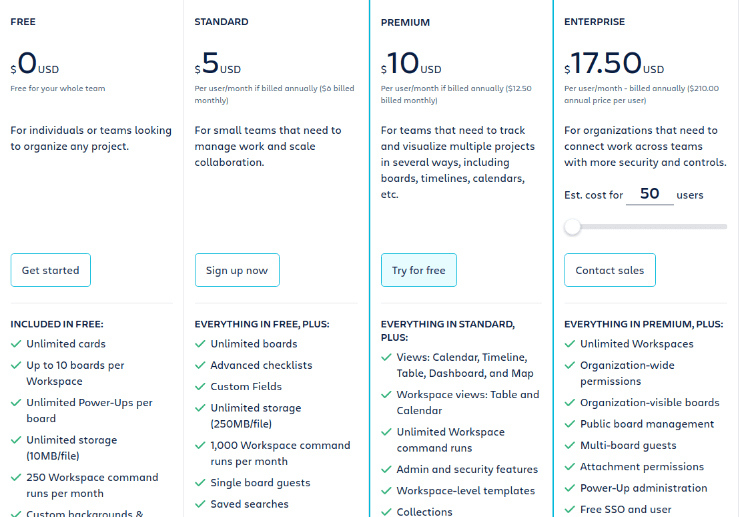
Though Trello’s free plan is pretty wholesome, it lacks many advanced, powerful features. To do so, you need to upgrade to its higher-pricing plans. Also, Trello gives you an average estimate of its enterprise plan for dedicated customer support and advanced security features. But that is still expensive to the value offered.
Monday.com
- Free plan: Limited to 3 boards and two seats
- Basic plan: $ 9/seat/month on annual billing
- Standard plan: $ 12/seat/month on annual billing
- Pro plan: $19/seat/month on annual billing
- Enterprise plan: Contact sales to get a quote
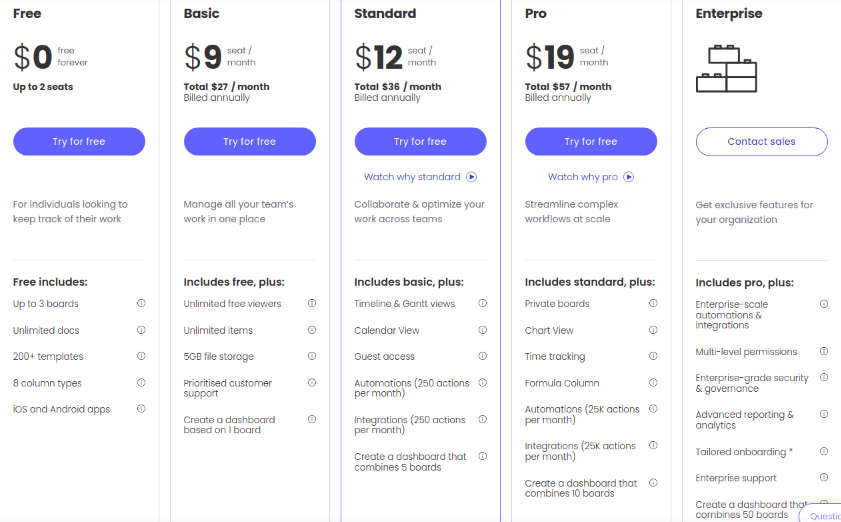
Monday’com offers four pricing tiers, requiring users to purchase the plan for at least three seats. If you want to buy a plan for 12 users, you’ll have to pay for 15 seats, making it pretty expensive.
Also, many essential features like time-tracking, Gantt charts, timeline view, and calendar view are limited to monday.com’s higher pricing tiers.
While Trello and Monday.com present per-user pricing models, ProofHub overshadows the two with its flat-fee pricing model. It helps you scale and count every spent penny without breaking the bank.
Explore ProofHub’s transparent flat (no-per-user) pricing plans and save yourself from the hassle of user-based charges.
Trello vs monday.com ratings and user reviews
User reviews and ratings reflect real-life user experiences and present what users like and dislike about the platform. Also, these platforms evaluate the user rankings based on the user reviews gathered from the community and data aggregated from online sources.
The user ratings of Trello and monday.com are mentioned below. There are also both positive and negative user reviews of both tools for better comparison.
Trello: Best suited for small teams and simple projects
- G2: 4.4
- Capterra: 4.5
- GetApp: 4.5
User positive reviews
- The most likeful thing about Trello is its easy-to-use project management dashboard. Its drag-drop-based feature makes it a very easy tool for all types of user regardless of their previous experience. – Bikash P., Product Research Analyst, Financial Services (G2 review)
- I love that I can set up a Trello board in just a few minutes, and it’s functional and ready to be used. – Matt, Director in US, Marketing & Advertising (Captera review)
- Trello is simple and easy to use, and I can manage my projects from anywhere. – Bento F, Consumer Services, self-employed (Getapp review)
User negative reviews
- Costly for more number of users. – Brajesh S., Senior Software Engineer, Enterprise(> 1000 emp.) (G2 review)
- The web version becomes laggy when too many cards are on the board. – Kantapat A., Web Development Manager (Captera review)
- It is not easy to switch works. Not optimized for complex work. – Jomon F., E-Learning (Getapp review)
Read more: Discover the best Trello alternatives & competitors and choose the right fit for your needs.
Monday.com: Best suited for large teams and complex projects
- G2: 4.7
- Capterra: 4.6
- GetApp: 4.6
User positive reviews
- Customizable, User-Friendly, Collaborative, & Well-organized – Emily B., Marketing & Administrative Associate (G2 review)
- I liked the visual clarity, flexibility, and intuitive interface of monday.com. It made project planning and tracking progress straightforward and efficient. – Gulam G., Senior Software Engineer, Computer Software (Captera review)
- It was really good for organizing information. – Snethemba N., Professional Training & Coaching (Getapp review)
User negative reviews
- Automations are too limited, and Customer Service help is a JOKE! – Alex V., General Manager] (G2 review)
- Some features are hard to understand, so we need to comprehend the platform a little bit more. – Carmen R., General Manager, Insurance (Captera review)
- Monday.com is a costly solution, and most add-ons add additional costs. – Lee F., Marketing and Advertising (Getapp review)
Read more: Struggling with monday.com’s add-on complexity? Choose from the Best Monday.com alternatives & competitors
A side-by-side comparison table of Trello vs Monday
Here is a brief outlook of how Trello and monday.com stand in comparison:
| Features | Trello | monday.com |
| Pricing | $ 50/user/month for 10 users | $ 90/seat/month for 10 users |
| Kanban boards | Yes | Yes |
| Gantt charts | No | Yes (in some plans) |
| Time tracking | No | Yes (in some plans) |
| Customization | Basic | Advanced |
| Built-in chat | No | No |
| Client Access | Yes | Yes |
| Centralized file management | No | Yes |
| Reports | Limited | Detailed |
| Customer support | Varies as per plans | 24/7 (not included in free plan) |
Which is better: Trello or monday.com?
Since now we are done with the detailed feature inspection of Trello and monday.com, let me give you a breakdown of what the platform is best suited for:
You can use Trello if,
- You want to handle simple projects with a simplified approach to the Kanban-based approach.
- You don’t want to spend a dime. You can use Trello’s free plan for limited storage and 10 boards per workspace.
- You don’t require high-end customization and in-depth reporting.
You can use Monday.com if,
- You want to handle complex projects with intricate workflows, task dependencies, and extensive customization.
- You want advanced project management features like task management views, time tracking, etc.
- You prefer a data-driven approach to project management.
But don’t forget that both platforms will test your budget limits when you think of scaling. So, is it the right choice for you?
Do you want to drain down your business budget when you can opt for a budget-friendly tool like ProofHub instead?
Let’s get to know ProofHub in detail:
ProofHub: A better alternative for project management
ProofHub is an all-in-one project management and team collaboration software that combines Trellos’ simplicity and Monday.com’s advanced features together in one central place. From crafting a project management plan to executing tasks efficiently, it helps you keep a finger on the pulse of your entire project.
This is a commendable alternative to seek after due to its flat-fee pricing structure. It makes scaling effortless and gives you a bang for your buck, unlike Trello and Monday.com, which add to your budget with every user onboarding.
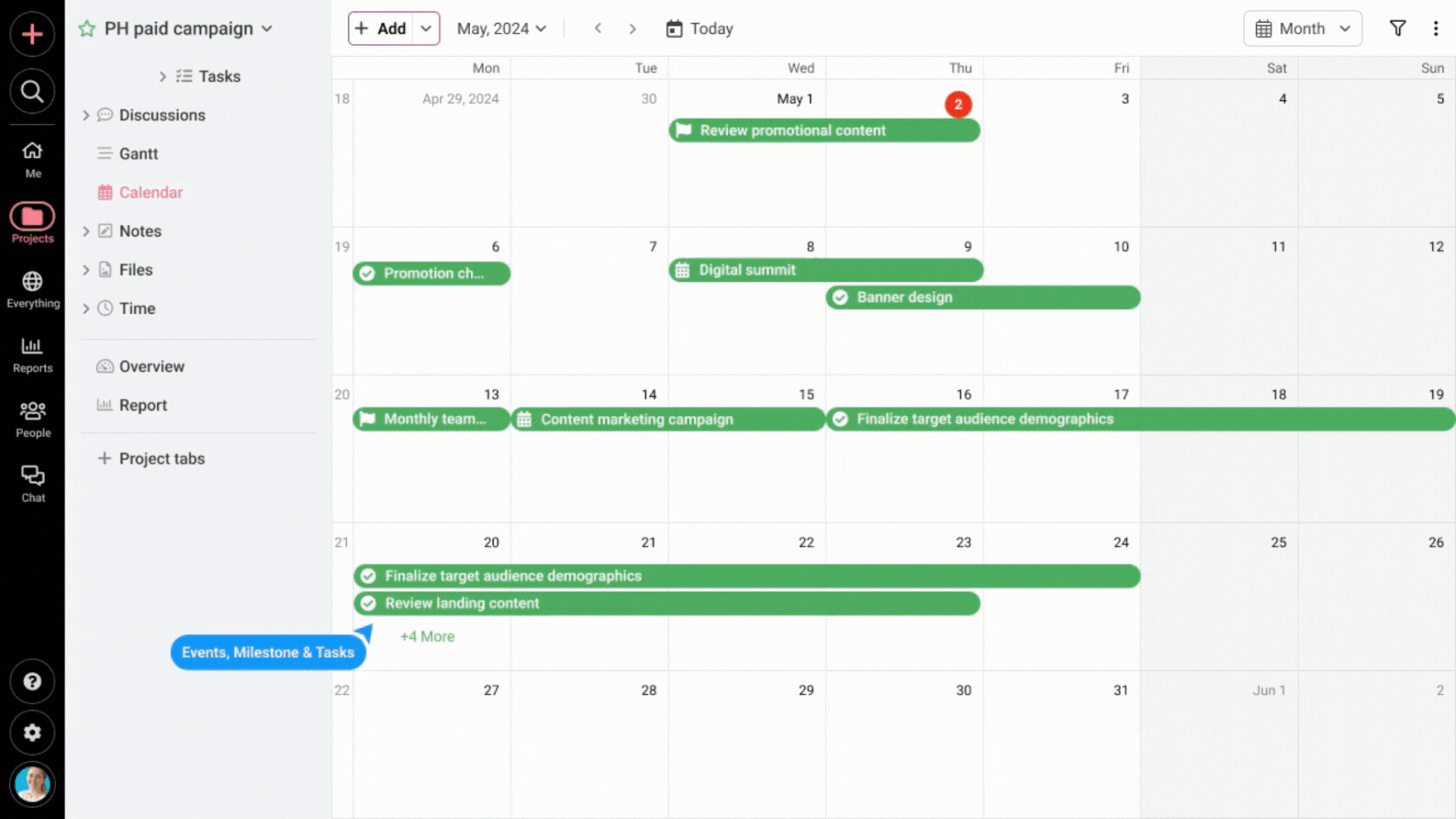
Some of its robust features are:
- Seamless task management to create, assign, and manage tasks using distinct task views.
- Built-in chat allows seamless and real-time one-on-one or group interactions and file sharing. (Missing in both Trello and Monday.com)
- Powerful collaboration features like announcements for sharing updates, discussions for brainstorming sessions, and notes to jot down crucial details. Also, use task comments and @mentions to grab someone’s attention and ask for updates.
- A highly intuitive and customizable user interface to help users plan, organize, and deliver projects seamlessly.
- Customize workflows to tailor them to your team’s operations and user-specific needs.
- Define custom roles to maintain user hierarchy and limit user access accordingly.
- Online proofing tool to review, approve, and leave feedback on creative assets and have ultimate version control.
- Gantt charts to streamline project planning, set task dependencies, and visualize project schedules.
- Native time tracking and timesheets record time spent on billing and invoicing tasks.
- Insightful and customizable reports to look into project progress, team performance, and employee workload and spot bottlenecks in time to make informed decisions.
- 24/7 customer support. Also, a Help & Support guide and video tutorials are available for assistance.
ProofHub’s user ratings and reviews on different websites:
- G2: 4.5
- Capterra: 4.6
- GetApp: 4.6
Its online proofing feature is something that stole our hearts from the very beginning. Also, we don’t need Slack anymore due to the built-in chat available. – Verified Reviewer in Information Technology & Services
Conclusion
The choice between the two in Trello vs. Monday.com is highly subjective. Both are different in their propositions and cater to various user needs. Where Trello keeps it a bit simple, Monday.com embraces comprehensiveness but with added complexity.
My clear-cut verdict is that monday.com is best suited for more extensive and complex projects. Trello excels in handling smaller and simplified projects.
ProofHub, on the other hand, provides a comprehensive solution. You can consider switching to the platform if you want the best of both together, along with some additional features and parameters, without breaking the bank.
FAQs
Which tool is better for project management Trello or monday?
If you want a simplified platform to overview your workflow, Trello’s Kanban boards are capable enough to serve your needs. However, if you want a holistic project management approach, monday.com is the preferred solution to look for.
What are the disadvantages of Trello?
Trello poses various disadvantages to its users-
- Trello raises some scalability concerns with its per-user pricing plan, resulting in escalating costs with every user onboarding.
- Trello is limited in functionalities and is highly dependent on external integrations called power-ups. This issue further adds a layer of cost to your budget.
- Many advanced project management features like time tracking, reporting tools, and Gantt charts are missing on Trello’s feature board.
Does monday.com integrate with Trello?
Yes. Monday.com does offer integration capabilities with Trello. You can directly import your Trello board onto the monday.com board, making the switch pretty convenient.
Can I use Monday.com for project management?
Yes, monday.com can be used for project management. The customizable platform offers features like task management, reporting, automation, and more for seamless project execution. But Monday.com per-user pricing plan can be a deal breaker for scaling businesses.
